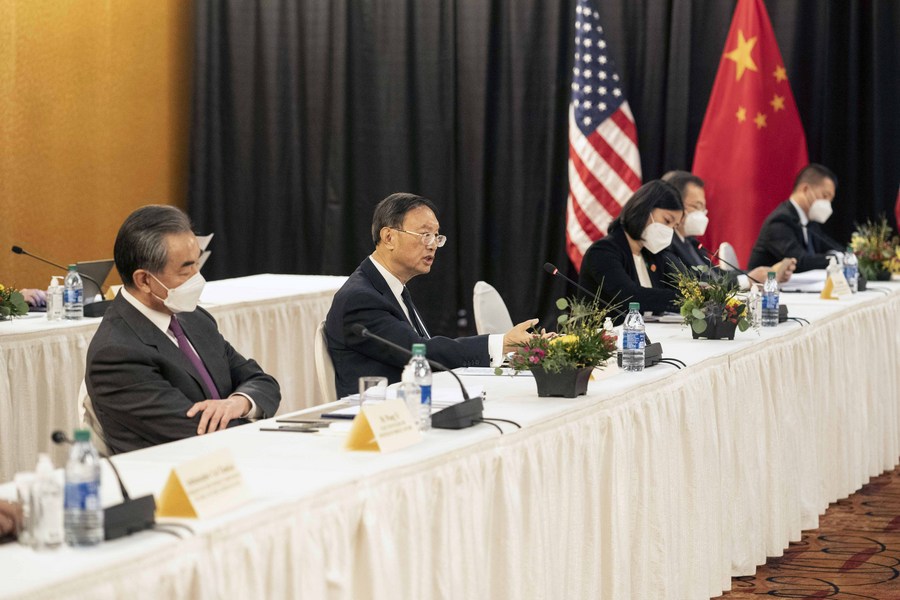China, U.S. hold candid, constructive dialogue, keeping door open to further communication
-- A China-U.S. high-level strategic dialogue concluded in the Alaskan city of Anchorage on Friday after the two sides had candid, constructive and helpful exchanges.
-- The dialogue marked the first high-level contact between the two countries after Chinese President Xi Jinping and his U.S. counterpart, Joe Biden, had a phone call on the eve of the Chinese Lunar New Year, and the first face-to-face talks between high-level officials of the two sides since Biden took office in January.
-- The two sides agreed to maintain dialogue and communication, conduct mutually beneficial cooperation, avoid misunderstanding and misjudgment, forestall conflict and confrontation, and promote sound and steady development of China-U.S. relations.
ANCHORAGE, the United States, March 19 (Xinhua) -- A China-U.S. high-level strategic dialogue concluded here on Friday after the two sides had candid, constructive and helpful exchanges, keeping the door open to further communication.

Yang Jiechi, a member of the Political Bureau of the Communist Party of China (CPC) Central Committee and director of the Office of the Foreign Affairs Commission of the CPC Central Committee, Chinese State Councilor and Foreign Minister Wang Yi, U.S. Secretary of State Antony Blinken and U.S. National Security Advisor Jake Sullivan attend a high-level strategic dialogue in the Alaskan city of Anchorage, the United States, March 18, 2021. Yang and Wang put forward China's stands on relevant issues at the start of the dialogue. (Xinhua/Liu Jie)
ENHANCING UNDERSTANDING
"We had exchanges on our respective domestic and foreign policies as well as the bilateral relationship. This strategic dialogue is candid, constructive and helpful," Yang Jiechi, a member of the Political Bureau of the Communist Party of China (CPC) Central Committee, told reporters after the two-day talks in Anchorage, the U.S. state of Alaska.
Yang, also director of the Office of the Foreign Affairs Commission of the CPC Central Committee, was joined by Chinese State Councilor and Foreign Minister Wang Yi, while the U.S. side was represented by Secretary of State Antony Blinken and National Security Advisor Jake Sullivan.
The dialogue marked the first high-level contact between the two countries after Chinese President Xi Jinping and his U.S. counterpart, Joe Biden, had a phone call on the eve of the Chinese Lunar New Year, and the first face-to-face talks between high-level officials of the two sides since Biden took office in January.
The two presidents had agreed that the two sides need to strengthen communication, manage differences and expand cooperation.
Despite a contentious opening on Thursday, in which the U.S. side provocatively launched groundless accusations against China and received strong response from the Chinese delegates, Yang said the dialogue is helpful and conducive to enhancing mutual understanding.
Peter B. Walker, senior partner emeritus at the U.S. worldwide management consulting firm McKinsey & Company, said patience is needed in amending China-U.S. relations.
"If you come away with a much better understanding of each side's priorities ... and you have mutual respect from people getting to know each other better, I think that's a good outcome," said Walker.
MANAGING DIFFERENCES
There are some important differences between China and the United States, but the two countries have the responsibility, ability and wisdom to find a way for major countries with different political systems to get along with each other, according to a statement released by the Chinese delegation.
Both sides have many concerns, but as Wang told reporters after the talks, some of their doubts can be eased through dialogue, while some long-existing problems can be managed through dialogue.
The Chinese delegation made it clear to the U.S. side that China has no intention to challenge or replace the U.S. status and influence, urging the United States to have a correct view of China's political system and development path, of China's major policies and principles, and of China's influence on the world.

Yang Jiechi, a member of the Political Bureau of the Communist Party of China (CPC) Central Committee and director of the Office of the Foreign Affairs Commission of the CPC Central Committee, puts forward China's stands on relevant issues at the start of the high-level strategic dialogue with the United States in the Alaskan city of Anchorage on March 18, 2021. Yang Jiechi, Chinese State Councilor and Foreign Minister Wang Yi, U.S. Secretary of State Antony Blinken and U.S. National Security Advisor Jake Sullivan attended the dialogue. (Xinhua/Liu Jie)
During the talks, the Chinese side also stressed red lines that should never be crossed. The governing status of the CPC and the security of China's socialist system should not be damaged, while sovereignty and territorial integrity are major issues of principle, according to the statement.
China is committed to non-conflict, non-confrontation, mutual respect and win-win cooperation with the United States, while firmly safeguarding its sovereignty, security and development interests, it said.
The two countries "have fundamental differences," but "the question is: can we find a way to manage relations despite each other's goals and behaviors that we disapprove of, or that we find inimical to our own interests," Robert Daly, director of the Wilson Center's Kissinger Institute on China and the United States, told Xinhua.
"I think that we need to be frank that this is going to be an extremely difficult long-term set of interactions," Daly said.
CONTINUING COMMUNICATION
Through face-to-face talks, the two sides agreed that they will maintain dialogue and communication, conduct mutually beneficial cooperation, avoid misunderstanding and misjudgment, forestall conflict and confrontation, and promote sound and steady development of China-U.S. relations.
Both sides expressed the hope to continue such type of high-level strategic communication, the Chinese delegation said.
China and the United States have a "huge amount of common interests" and the relationship between the two "huge, complex" countries needs to grow "on a systematic basis," Jeffrey Sachs, director of the Center for Sustainable Development at Columbia University, told Xinhua.
The just-concluded dialogue saw the two sides discuss a wide range of issues, including reciprocal arrangements for the COVID-19 vaccination of each side's diplomats and consular officials, adjusting travel and visa policies according to the pandemic situation, and gradually promoting the normalization of personnel exchanges.
Notably, China and the United States decided to establish a joint working group on climate change, and agreed to maintain and enhance communication and coordination on a variety of global and regional affairs.
The United States also reiterated its adherence to the one-China policy on the Taiwan question.
It is "obviously in everyone's best interest" for China and the United States to have a "good, solid working relationship however that ultimately gets to be defined," Robert Lawrence Kuhn, chairman of the Kuhn Foundation, told Xinhua.

Yang Jiechi, a member of the Political Bureau of the Communist Party of China (CPC) Central Committee and director of the Office of the Foreign Affairs Commission of the CPC Central Committee, and Chinese State Councilor and Foreign Minister Wang Yi receive an interview with media following the end of the high-level strategic dialogue with the United States in the Alaskan city of Anchorage on March 19, 2021. (Xinhua/Liu Jie)
China's attitude towards developing the China-U.S. relationship is clear and consistent, Wang said after the dialogue, expressing hope that the United States would meet China halfway, and in particular, the two sides should respect each other's core interests and major concerns.
It is upon that basis that the door for China-U.S. dialogue would always remain open, he said. (Video reporters: Hu Yousong, Tan Yixiao, Gao pan, Liu Pinran, Lu Jiafei, Chen Chen; Video editors: Hongling, Jiang Hanzhang, Zhengxin)
Photos
Related Stories
- Anti-Asian crime: a plague the U.S. fails to address
- Obstacles to U.S. attempt to solidify trilateral cooperation with S. Korea, Japan
- UN review exposes dark side of U.S. human rights record
- S. Korea, U.S. defense, foreign ministers hold "2+2" talks about Korean Peninsula, regional issues
- Senate unanimously confirms Katherine Tai as U.S. trade representative
Copyright © 2021 People's Daily Online. All Rights Reserved.










